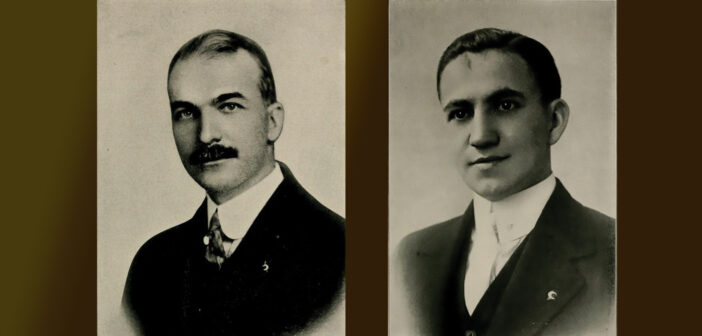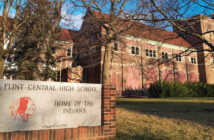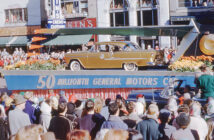From 1912 to 1928, Flint became known as one of the centers of manufacturing and commerce in the nation. “Business” was the name of the game and new ventures popped up daily – some that still operate today. Immigrants and wandering workers flooded the city bringing with them new ideas, work ethics and politics. The mayors of the time period had much to oversee and overcome including legal, social and political challenges. The start of Prohibition in 1920 offered its own temptations that at least one mayor couldn’t resist. It was a time of great noise and great challenge. Were the mayors up to the task?
This series has tracked each of the city’s mayor’s throughout history, providing a short account of their professions, lives and decisions during their terms (if known). Some were men/women of great deeds or of great controversy; some simply acted as placeholders in time. Each of them, however, chaired a city important to its country and its citizens on its path through triumph and heartbreak, and toward its revitalization.
For part 1 in this series, see the 2022 January issue of MCM!
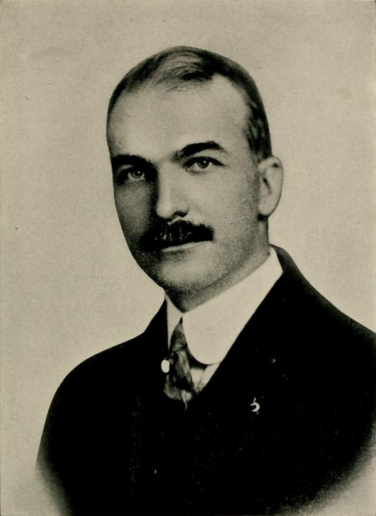 Charles Stewart Mott
Charles Stewart Mott
1912-14, 1918-19
After running as an independent and defeating Flint’s only socialist mayor, John A. C. Menton, C. S. Mott took the reins of the city in 1912 for the first of two consecutive terms. In 1918, he was elected to a third term as mayor. C.S. Mott was born in 1875 in Newark, NJ, the son of John Mott, owner of the Mott Beverage Company. Mott attended and graduated from Stevens Institute of Technology in 1897 and after learning the beverage trade overseas, took the job of superintendent for his uncle Frederick’s business, Weston-Mott Wheel Works (much to his father’s chagrin). Under Mott’s supervision, the company joined the automobile craze and transitioned from bicycle accessories to the manufacture of automobile wheels and axles. He moved the company to Flint in 1905 after an invitation from Billy Durant. Mott embraced and adopted his new home immediately upon arrival and never looked back. After selling Weston-Mott to General Motors, he became the largest individual stockholder of GM, served as its vice president from 1916-1937, and served on its board of directors for 60-years, right up until his death in 1973. Politically, Mott also served as the Michigan delegate to the Republican National Convention and was selected Republican Presidential Elector Candidate in 1964.
In 1926, Mott cemented his legacy in Flint and around the world when he established the C. S. Mott Foundation – a charitable organization with a purpose to support and enrich communities at home and abroad. Through the foundation and personal gifts, Mott helped establish the community school program with Frank Manley and the Mott Children’s Health Centers in Flint and Ann Arbor. In 1950, Mott donated $1 million worth of land to turn Flint Junior College into a four-year institution; the school honored his donation by changing its name to Mott Community College. (These are just a few of the many things Mott spearheaded and funded in his quest for a better Flint.)
As mayor, Mott built a modern sewer system, a separate stormwater system, and expanded the network of paved roads and sidewalks. During his time in office, Chevrolet began production in Flint, the What Cheer Coal mine went into operation, Baker College opened its doors, the YMCA was organized (with Mott as chairman) and the Flint Institute of Technology (later General Motors Institute) was founded. C. S. Mott was buried in Glenwood Cemetery.
John R. MacDonald
1914-15
MacDonald was born in Moretown, VT in 1857. After coming to Flint, he was very involved in the social groups and orders of the day including the Knights of the Loyal Guard, Freemasons, Shriners, and Knights of Pythias. Much of MacDonald’s life in Flint has fallen into obscurity; however, in his speech given to the Michigan State Dairymen’s Association during their convention in Flint, he provided an accurate snapshot of the city during his time. He said,“I am sure that you will pardon us for taking pride in the fact that Genesee County has more miles of improved roads than any other county in the state. The city of Flint, with a population of 13,000 in 1900 has grown to 50,000 inhabitants at the present time. We are in the midst of a great street construction, carrying with it as a matter of course pavements, sewers and water extensions. During the past year, we constructed upwards of 13 miles of pavement, 10 miles of concrete sidewalks, and 18 miles of sewers. We have five automobile plants here in the city, the Buick, Chevrolet, Paterson, Monroe, and Dort. The Buick has more floor space than any other automobile plant on the face of the globe. We have 27 school buildings employing upwards of 200 teachers, besides two parochial schools, two business colleges, and the Michigan School for the Deaf. We have 27 churches and over 30 church societies; a fully equipped Young Women’s Christian Association, a new Young Men’s Christian Association building, which has just been completed, one of the finest in the country.” After taking a fall at his home in 1946, MacDonald passed away at Hurley Hospital. He was buried in Avondale Cemetery.
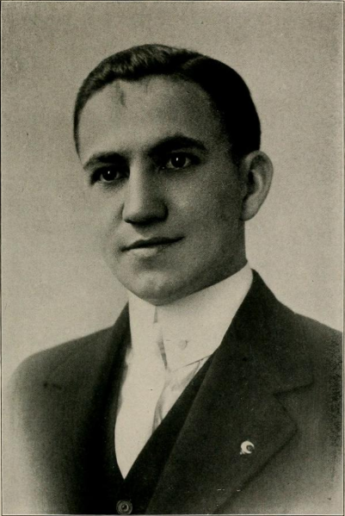 William H. McKeighan
William H. McKeighan
1915-16, 1922-23, 1927-28, 1931-33
Perhaps the biggest swindler to ever take the reigns of Flint, McKeighan was one of three political bosses of his day (along with Detroit’s Ed Barnard and Grand Rapids’ Frank D. McKay) with ties to Detroit’s Purple Gang and the corruption and lawlessness that came with it. Born in 1886 in Cleveland, OH he attended school in Saginaw, MI. He moved to Flint in 1908 and established a legitimate pharmacy, also spending some time as a motion picture operator, garage manager and auto salesman. Just before his political career began, he opened a pool hall and barbershop on the corner of Leith and Industrial that served as his base of operations for future “business.” In 1913, he was elected alderman of the city and routed that influence into a 1915 mayoral run. McKeighan was elected to three terms by popular vote, and two via the city’s 1929 charter that stipulated a council-manager form of government for which he was directly responsible.
In 1927, McKeighan faced a recall election, during which he had police round up and arrest recall supporters. He survived his recall, yet in the next year, was under investigation for an assortment of crimes including bribery and vote-tampering. His turbulent term resulted in a change to the city charter and installation of the council-manager form of government. Still, he was named manager in 1931 by the council which ended two years later when his council cronies were themselves arrested for fraud. Through it all, McKeighan continued to skate free and even served in 1940 as a delegate to the Republican National Convention. In 1945, he was charged with conspiracy to violate state liquor laws. With a judge-directed verdict of “not guilty”, McKeighan again dodged the law. He died in 1957, having never once been held accountable for his crimes.
Earl F. Johnson
1916-17
Earl F. Johnson was Genesee County-made. He was born in Thetford Township in 1868 and was educated in that area until his high school years when he attended Flint High School. He worked as a school teacher for three years until opening a general store at East Thetford which he operated for ten. While there, he served as township supervisor and treasurer. In 1898, he was elected Genesee County treasurer and followed that election with a move to Flint. In 1903, he was appointed division deputy revenue collector for the First District of Michigan – a post he held until 1914. He then became a business agent for the Union Trust and Savings Bank of Flint in 1915. He was an extremely well-known and respected man about town and when he ran for mayor in 1916, he won by the greatest majority ever given a candidate in Flint at that time. Like many before him, he was quite active socially and was a member of the Freemasons, Knights Templar, Nobles of the Moslem Temple, Nobles of the Mystic Shrine, and Elks. In 1923, he served as a member of the State Senate and State Institute Commission. During his time as mayor, the Koegel meat company was founded. Johnson died in 1947.
George C. Kellar
1917-18, 1919-20
Kellar served two non-consecutive terms as Flint’s mayor and could have served three straight had C. S. Mott not run in 1918. Born in 1879 in Tyler County, WV he graduated from West Virginia Wesleyan College in 1905 and then spent a year teaching at Harvard University. After arriving in Flint in 1908, Kellar opened the George C. Kellar & Brother real estate firm with his brother, Francis M. Kellar. Kellar took an interest in local politics and in 1916 was elected alderman and president pro tempore of the Flint City Common Council. During his first mayoral term, Kellar looked to the future and ways to expand the city. With adjustments from C. S. Mott during his own term, Kellar accepted a new city plan in his second term that focused upon – among other things – increasing the size of Flint’s main streets, revamping school playgrounds, adding additional riverfront parks, and the construction of a downtown civic center complete with walkable city hall, library, art gallery and more. The design was that of the National Mall in Washington, D. C. Most of the 1920 plan did not come to fruition with some small exceptions, the most notable being the construction of a new high school. The new Flint High School was built in 1923 (becoming Flint Central in later years). Another change of historical significance happened when Kellar had the original Flint arches removed to make way for city plan improvements. George C. Kellar died in 1954.
Edwin W. Atwood
1920-22
Born in Flint to lumber and banking magnate William A. Atwood in 1875, Edwin grew up and spent his life a resident of the city. His father was one of those influential city types, his reputation flowed to and mirrored by his son in business and social life. Edwin spent the majority of his time in charity work and investments. He was a charter member of the Flint Golf Club and acted as president of the Flint Council for the Boy Scouts of America. He donated to the building of Hurley Hospital and acted as secretary of the hospital board. He also relished the arts and followed in his family’s footsteps as a member of the Shakespeare Club. Edwin W. Atwood first ran for mayor in that crazy election of 1911 pitting the Republican Atwood against Democrat William Wildanger and Socialist John A. C. Menton. Menton, in perhaps the biggest election upset in Flint history, won, causing Atwood to step away from political life for a time.
In 1920, he made the decision to give it another try and emerged victorious. In 1912, Atwood met and befriended inventor Lloyd Copeman and provided most of the capital for Copeman’s Electric Stove Company and later, he invested in Copeman Laboratories Co. While in office, Atwood worked with Copeman to obtain patents on two separate refrigeration apparatus of which Atwood was the beneficiary. Additionally, while in office, Atwood oversaw the opening of the Durant Hotel, and the Flint Amusement Park, now lost to time. After office, Atwood made his most recognizable contribution to the City of Flint when he donated his family’s land on Atwood Island to the city for the construction of an athletic stadium. Atwood Stadium (named after Edwin’s father) is still the premier athletic venue in the City of Flint. In his later years, Edwin Atwood donated a mosaic and wainscoting to St. Paul’s Episcopal Church. He died in 1958 and was buried in Glenwood Cemetery.
David R. Cuthbertson
1923-24
David R. Cuthbertson had perhaps the shortest tenure of any Flint mayor, lasting less than a year. He was born in 1868 in Taymouth, MI and owned and operated a sawmill in Flint. In 1923, he ran against and ousted William McKeighan after his second term to the angst and dismay of McKeighan’s questionable supporters, particularly the Klu Klux Klan. The KKK were gaining political power in the city during the Roaring Twenties and were able to push their influence by taking control of the Genesee County Convention and gaining office in Flint wards and county townships. They took an exception to Cuthbertson’s victory over McKeighan from the start. Cuthbertson rode in on a wave of law & order and immediately set to his task. He came down hard on speakeasies and illegal liquor sales during prohibition but was unable to completely stop the flow into the city.
The KKK used this “failure” to push the narrative that he was an inept leader and also took exception with Cuthbertson’s hiring of married women for governmental positions. The final straw was when Cuthbertson named James P. Cole – a Catholic – as acting police chief. They demanded a recall of the election. Before the election was to take place, the KKK blanketed the city with anti-Cuthbertson propaganda dropped from a plane and rallied to go door-to-door to get the votes. Cuthbertson lost the recall election. He ran in the replacement election but lost to the KKK backed Judson L. Transue. During his short time in office, Cuthbertson passed upgraded building codes and housing laws. He died in 1941 and was buried with his family in Taymouth Cemetery.
Judson L. Transue
1924-27
Backed by the Ku Klux Klan and running on a campaign of anti-immigrant rhetoric and conspiracies concerning Flint’s rich and successful citizens, Transue won the replacement election after the recall of Mayor Cuthbertson, despite the former mayor owning the support of city newspapers and businessmen. Transue was born in Williamson, NY in 1897 and worked in Flint, first as a schoolteacher and then as a banker. Despite owing his mayorship to KKK-fueled bigotry, Transue did not concede to all their demands. He did fire all the women hired by Cuthbertson but kept Catholic police chief, James P. Cole – a decision that greatly angered the KKK. Transue worked to disavow any association to the group to no avail.
While mayor, Transue added regulations to the sale of meat in order to quell the amount of bad meat finding its way to city consumers. He also was a driving force behind the creation of the Grand Trunk Railroad’s Western Line that ran from Belsay through Swartz Creek. He even drove the final spike to complete the tracking. Transportation continued to be first and foremost in Transue’s administration after he approved and built an eight-man committee to lobby the state to obtain more state-constructed roads in the city as well as the rest of Genesee County. After his terms as mayor, Transue went into real estate and set up the firm of Dain & Transue. Judson L. Transue died in 1980 and was buried in Sunset Hills Cemetery.

